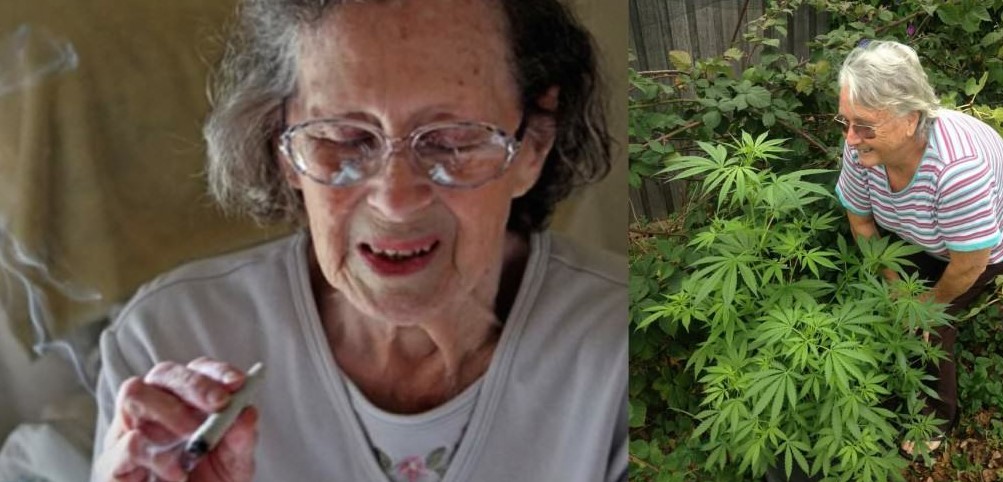Non classé
Best Marijuana Strains That Help Treat Alzheimer’s Disease
Medical professionals are split on cannabis’ effects. Some specialists are completely behind it, seeing the benefits of medical cannabis firsthand. Others hold negative views on the topic. There are a few FDA-approved Big Pharma medications on the market, including Sativex and Epidiolex.

Medical cannabis, on the other hand, is still against the law. Increasing numbers of patients are discovering that “traditional” therapies aren’t always effective. This fact pushes them to look for alternatives such as cannabis. The plant has been proven to have beneficial effects in the treatment of specific diseases. Medical experts remain on the fence about the effectiveness of MMJ because there isn’t enough medical evidence.
Although there is much research yet to be done, advocates hope that in the future, there will be enough evidence to persuade people to change their minds. Alzheimer’s patients and their loved ones are prepared to utilize cannabis due to its potential benefits. Those who find themselves in this unfortunate circumstance believe it is worth taking a chance since the disease endangers one’s quality of life.
What Is Alzheimer’s?
Alzheimer’s disease (AD) is the most prevalent type of dementia. It affects 60-80% of all persons with dementia. According to the Alzheimer’s Association, 5.8 million Americans are currently living with the condition. It is the sixth leading cause of death in the United States, accounting for 15 percent of all deaths among people 65 and older. Among people over 65; it ranks third after heart illness and cancer.
It’s vital to recognize that Alzheimer’s disease is not a normal part of getting older. However, it gets worse with time, and there is currently no cure.
Alzheimer’s disease is a progressive, degenerative brain illness that slowly robs its victims of the ability to function independently. By 2050, 14 million Americans are expected to have it. Although it isn’t a true “aging disease,” the chances of developing it increase with age. The incidence of Alzheimer’s will almost certainly rise as people live longer.
Causes of Alzheimer’s
Alzheimer’s disease is still an enigma. Researchers believe that one of the following may be related to its development:
- Family history
- Aging
- Previous severe head injuries
- Lifestyle factors and conditions associated with vascular disease
Symptoms of Alzheimer’s Disease
Alzheimer’s disease is a progressive illness. As you get older, it gets worse. During the early phases of Alzheimer’s disease, you may experience:

- Memory problems
- Recognition problems
- Difficulty with speech
- Issues completing familiar tasks
- Trouble understanding visual images and spatial relationships
- Increasing problems with organizing and planning
As Alzheimer’s disease develops, other symptoms include:
- Personality or behavioral changes
- Disorientation
- Poor judgment
- Increased risk of wandering and getting lost
- Changes in sleep patterns
- Trouble controlling bladder and bowel movements
Is Cannabis an Effective Treatment for Alzheimer’s Disease?
Tetrahydrocannabinol (THC), the most common psychoactive ingredient in marijuana, may be an option. It has the potential to aid Alzheimer’s sufferers since it can break up amyloid-beta protein clumps from the brain. Amyloid-beta is a hazardous component that accumulates like plaque in the brains of Alzheimer’s patients.
The inflammation that develops as the brain responds to the formation of amyloid-beta is also a component of the condition. One of marijuana’s possible advantages is to assist with inflammation.
Cannabinoids from cannabis enter the circulation when you smoke it. They attach to cannabinoid receptors in the endocannabinoid system (ECS) called CB1 and CB2, which are present throughout the body. These receptors are particularly abundant in brain neurons that handle memory, thinking, and coordination.
According to recent research, THC binds to CB receptors and has an impact on brain aging. Its apparent ability to aid the body in eliminating amyloid-beta buildup is amazing news for individuals with Alzheimer’s.
What Does the Research Say?
Cao et al. published a study in the Journal of Alzheimer’s Disease in 2014 on the therapeutic possibilities of THC for AD. The authors found that THC has potential therapeutic benefits as a therapy for AD through various actions and pathways.
THC directly interacted with amyloid-beta peptides, according to one of the study’s major findings. As a result, THC inhibited aggressiveness. Low doses of THC may improve mitochondria function, according to preliminary research.
Cannabinoids were found to remove plaque-forming Alzheimer’s proteins from brain cells, according to a study published in the June 2016 edition of Aging and Mechanisms of Disease by Salk Institute students. Researchers examined nerve cells with amyloid-beta production problems so they could recreate some aspects of Alzheimer’s disease in the lab.
They discovered that high amounts of plaque were linked to greater rates of neuronal death and cellular inflammation. The cells were exposed to THC, and the level of amyloid-beta was reduced. The chemical also appeared to suppress the inflammatory response triggered by the protein. As a result, nerve cells survived because they were no longer attacked by the inflammatory response.
The study revealed that inflammation in the brain is a contributing element to AD damage. He said that, contrary to popular belief, the response came from nerve cells rather than immune-like cells in the brain. There’s also a chance that increased endocannabinoid synthesis might postpone Alzheimer’s disease progression.
Best Marijuana Strains for Treating Alzheimer’s
Purple Kush (Indica Marijuana Strain)
Purple Kush is a nearly pure indica souche. It has purple leaves and compact buds, which have earned it the name “Purple Hulk.” This marijuana strain is powerful, with an THC concentration of up to 22 percent. Its low CBD level of less than 0.1 percent has no impact on the strong intoxicating effects. A Purple Afghani and Hindu Kush crossed it.
Purple Kush is a powerful night-time medicine that helps to relax the body and mind. Its medicinal advantages may help with a number of issues including sleeplessness and depression. Purple Kush may also aid in the treatment of frustrations and mood swings associated with Alzheimer’s disease.
OG Kush (Hybrid Marijuana Strain)
The OG Kush strain is a strong indica-dominant hybrid with as much as 26% THC and 0.3 percent CBD and may help with Alzheimer’s symptoms. It was created by crossing the Old World Paki Kush (possibly Hindu Kush) with Chemdawg, an indica-dominant hybrid. Depending on where you get it, OG Kush has up to 26% THC and 0.3 percent CBD.
Patients commonly use OG Kush to treat migraines, ADD/ADHD, and stress, but it is occasionally advised for Alzheimer’s patients. It depends on the degree of the illness’s progression and the symptoms that the patient is experiencing. If you’re using it for the first time, keep in mind how powerful OG Kush is! nOG Kush strikes you quickly and hard.
Sour Diesel (Sativa Dominant Marijuana Strain)
Sour Diesel is one of those strains that appear on every list. This sativa-dominant strain has a fast, energizing, and relaxing impact. Its uplifting qualities make it useful for stress, pain, and depression. It may also help with mood swings associated with Alzheimer’s disease.
Sour Diesel is a mix of Super Skunk and Chemdawg 91. It’s not for novices since it has a THC concentration of up to 22%, as opposed to 0.2 CBD in Chemdawg 91. While this marijuana strain is popular among MMJ patients, its cerebral effect draws in a large number of recreational users. The high produced by this variety can last up to five hours!
Green Crack (Sativa Dominant Marijuana Hybrid)
The ultimate happy strain is Green Crack. This strain makes you feel better the moment you start to consume it, thanks to its high content of THC. Green Crack is a sativa-dominant hybrid bred from Sweet Leaf and Skunk #1.
An energetic citrus strain with a zest that will have you bouncing off the walls, this marijuana strain is ideal for a dark mornings or a stressful day. Please be advised that this strain increases appetite, so plan to eat plentifully. It relaxes people without making them feel drowsy or lethargic, which is why it’s popular among MMJ patients.
Acapulco Gold (Sativa Dominant Hybrid Marijuana Strain)
Acapulco Gold is one of the most famous cannabis strains in the world. Acapulco Gold, according to most dispensaries, is a good treatment for a variety of medical issues, including Alzheimer’s disease. Because the strain comes from places around Acapulco, Mexico, it has been given its name. It’s a sativa-dominant strain with THC levels up to 24 percent.
Acapulco Gold has bright green and brown resin accumulating on the buds, giving it a golden hue. Acapulco Gold is recognized for being one of the finest medical marijuana strains. Its growing conditions are becoming increasingly rare as a result of its particular growing requirements.
Moving Forward with Medical Marijuana for Alzheimer’s Disease
Medical marijuana has been studied for Alzheimer’s disease symptoms, but the science is still in its infancy. Because not all strains will be beneficial, it’s critical to be wary of common sativa/indica blends. Some marijuana plants can even exacerbate the condition.
When using cannabis to treat Alzheimer’s disease, the proper THC/CBD ratio must be maintained. Irritation of activated brain receptors can occur if an incorrect rate is used.
Before using medical marijuana for any ailment, you should consult with a medical expert. We are not doctors, and the information in this post should not be taken as medical advice.


